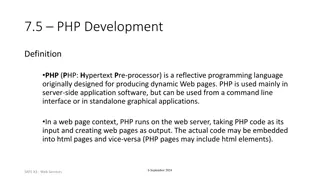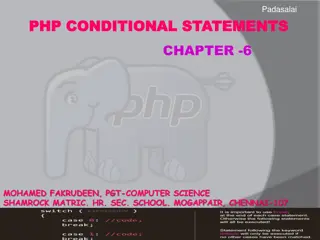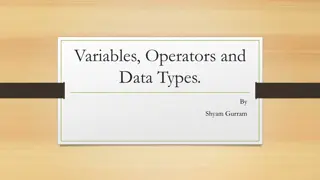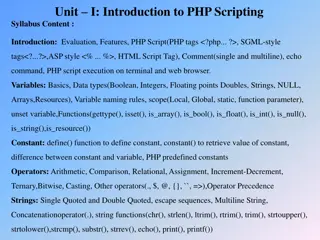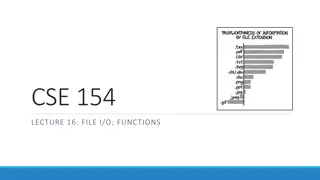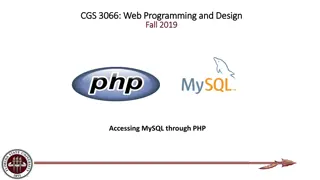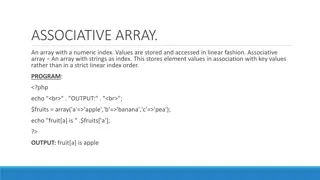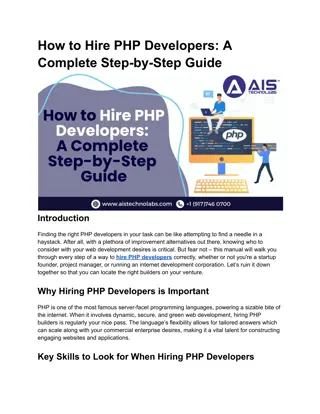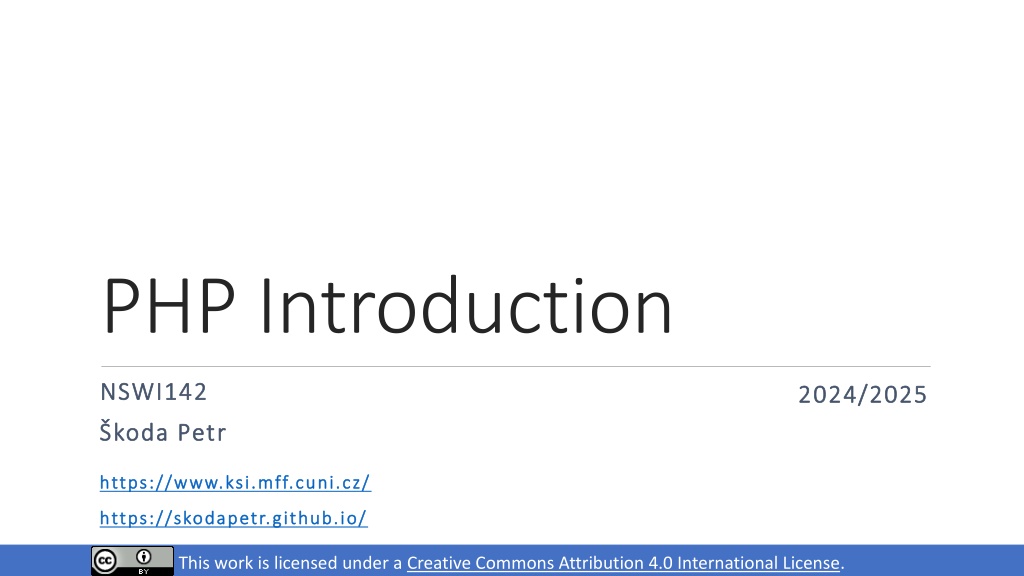
A Brief Overview of PHP History and Syntax
PHP, a popular scripting language, has a rich history dating back to 1994 when Rasmus Lerdorf created Personal Home Page tools. Over the years, PHP has evolved, with significant updates such as PHP 5, PHP 7, and the more recent PHP 8. The language features weakly typed dynamic characteristics, making it versatile for various web development tasks. The syntax includes key elements like control structures and pure PHP script requirements. Explore the nuances of PHP through this insightful narrative.
Uploaded on | 0 Views
Download Presentation

Please find below an Image/Link to download the presentation.
The content on the website is provided AS IS for your information and personal use only. It may not be sold, licensed, or shared on other websites without obtaining consent from the author. Download presentation by click this link. If you encounter any issues during the download, it is possible that the publisher has removed the file from their server.
E N D
Presentation Transcript
PHP Introduction NSWI142 NSWI142 2024/2025 2024/2025 koda Petr koda Petr https://www.ksi.mff.cuni.cz/ https://www.ksi.mff.cuni.cz/ https://skodapetr.github.io/ https://skodapetr.github.io/ This work is licensed under a Creative Commons Attribution 4.0 International License.
History 1994 Rasmus Lerdorf created Personal Home Page Perl scripts to maintain CGI-like pages, later re-written to C++. Mostly for template processing 1995 Public release, community formed 1997 PHP/FI 2.0 released Zeev Suraski and Andi Gutmans Rebranded to PHP: Hypertext Preprocessor ZeEnd, takes care of PHP 1999 PHP core rewritten to Zend Engine 2000 PHP 4 released (based on Zend Engine 1.0) OOP first introduced to PHP (in a bad way, slow implementation) 3
History 2004 PHP 5 released (Zend Engine II) OOP completely redesigned, concepts from C# and Java 2015 PHP 7 released (Zend Engine III, AST-based) There was no version 6, as features get implemented into version 5. 2020 PHP 8 released Introducing JIT, Named arguments, Match expression, Internal function errors 2023 September PHP 8.2.11 Ele ant 4
Demo Documentation https://www.php.net/manual/en/
Weakly Typed Dynamic Language Weak Dynamic Typing Strong Static Typing PHP, Javascript, Python C, C++, C#, Java, Type is held at values (variables are type-less) Type is held at variables and values (mismatch = type cast or error) Resolved at runtime Resolved at compile time Variable is just a registered name Variable allocates memory Compile time error int x = 42; x = "hippo"; $x = 42; $x = "hippo"; Runtime check Inferred by compiler function foo(int $count) auto y = 54; 2023/2024 Optional content 6
PHP Script Pure PHP Scripts Must start with <?php, but no ending mark is required, nor recommended. Not required in interactive mode. Basic Syntax: C-like syntax with relics from Perl. Statement separated by ';', blocks enclosed in ' {', '} ' . Line comments // \n, block comments /* */ 7
Control Syntax Standard control structures if (cond) stmt; elseif (cond2) stmt2; else ... while (cond) stmt; do stmt; while (cond); for (init; cond; inc) stmt; foreach (array as [ $key => ] $value) stmt; 8
Values and Data Types Values in PHP have explicit type. Scalar (boolean, integer, float, or string) Compound (array, object) Special (resource, NULL) Type can be tested by built-in functions: is_int(), is_string(), is_numeric(), is_scalar(), gettype() returns human-readable representation Type casting (explicit re-typing) using C-like syntax (type-name)expression. Type juggling automatic type casting. 9
Variables All variables are prefixed with '$' symbol (e.g., $x). No declarations, thus not statically defined type. Variable is created on the first assignment. Variable has the type of the value assigned to it. Variables have function (local) or global scope. Keyword global maps global variables in local scope. Using non-existing variable generates notice. And the value is treated as null. Functions for variable manipulation and testing: isset(), unset(), var_dump() 10
Example $foo = 42; ... isset($foo); ... isset($bar); true false function bar() { ... isset($foo); $foo = 1; print("Local foo == $foo . $foo . "\n); global $foo; print("Global foo == . $foo . "\n ); } false Local foo == 1 Global foo == 42 Notice-level error, $foo is not declared bar(); unset($foo); print("foo == . $foo . "\n ); $foo value is null by default 11
Constants Defined as "superglobal , do not have scope. define("MYFOO", expression); print(MYFOO); Magic constants are automatically defined. Their value is related to their position in the code: __LINE__ - number of the script line __FILE__ - name of the script file __DIR__ - directory of the script file __FUNCTION__ - name of the outer function __CLASS__ - name of the outer class 12
Expressions Almost every statement is an expression. PHP has all standard C-like operators Arithmetic, bitwise, logical, Identity operator (equality & type equality) '===', '!==' String concatenation is performed by dot '.' Regular comparison allows type juggling, identity comparison not. I.e., 42 == '42' but 42 !== '42' String Literals Single quoted strings ('text') no special treatment Double quoted strings ("text") interpreted Special escaped characters (\n, \r, \t, ) Variables are replaced by their contents $a = 'foo'; $b = "Say $a\n"; $bvalue is Say foo (ended with newline) 13
Strings and Text Processing PHP have a huge arsenal of string functions strlen(), substr(), trim(), explode(), join(), Libraries for charset manipulation: Multibyte string lib, Iconv lib, Recode, Functions for encoding (to URL, HTML, SQL, ): urlencode(), urldecode() htmlspecialchars(), htmlspecialchars_decode() mysqli_real_escape_string() 14
Arrays Array in PHP is an ordered map of key-value pairs. Can be used as array, list, hash table, dictionary, stack/queue, multi-dimensional array, or tree. Defining arrays array language construct. $a1 = array(1, 2, 3); $a1 = [1, 2, 3]; $a2 = array('foo' => 42, 'bar' => 54); Newer JS-compatible syntax Accessing elements Prints 44 print($a1[1] + $a2['foo ]); $a2['spam'] = 19; $a1[] = 4; unset($a1[2]); The following key is assigned $a1 ~ [0=>1, 1=>2, 3=>4] Each element may have different type. 15
Arrays Each key can be either an integer or a string. Strings containing valid numbers are casted to integers. Floats are truncated and casted to integers. Booleans are casted to either 0 (false) or 1 (true). null is casted to an empty string. Arrays and objects cannot be used as keys! Built-in functions for array manipulation array_key_exists(), in_array() array_push(), array_pop(), array_shift() array_merge() ... 16
Arrays Array holds internal pointer for iteration. reset() end() next(), prev() key(), current() rewinds the pointer sets the pointer to the last element move the pointer actual key/value Sorting is slightly more complicated many combinations sort(), asort(), ksort(), usort(), uksort(), Tokenization explode(), implode() Destructive assignment list($a, $b, $c) = [1, 2, 3] 17
Demo Variables, Control Constructs, Standard Output
Functions Declaration : keyword function followed by the identifier. function foo([args, ]) { body } The function body can be pretty much anything. Even nested function/class declaration, evaluated when function is first called. You probably do not need to use this. A value can be yielded back by the return construct. Invocation foo(argument-expressions); Functions are 2nd level citizens and identifier space is flat. There are namespaces. Pass by value vs pass by reference (C++ style). 19
Function Arguments You can pass arguments to a function. Implicit values may be provided function foo($x, $y = 1, $z = 2) { } Arguments with implicit values are aligned to the right Note that PHP functions does not support overloading. Functions have variable number of arguments. func_num_args(), func_get_arg(), func_get_args() function foo($a, $b, ...$rest) $rest gets remaining arguments as an array. Splat operator ( ) works also for argument unpacking. $args = [1, 2]; foo(...$args); // foo(1,2); 20
Anonymous Functions A function without a name. $fnc = function ($arg) { body }; $fnc(42); The anonymous function is an instance of Closure. It can be passed on like an object. The visible variables must be explicitly stated, similar to C++. These variables are captured in the closure. Variables passed by reference can be modified. $fnc = function ( ) use ($var) { }; You can also use different way to create a Nameless/Lambda functions, this is obsolete. $multiply = create_function('$x, $y', 'return $x*$y'); 21
Anonymous Functions // PHP is not like JavaScript, functions are not first class citizens. // Note that the anonymous functions do not work as methods. $obj = new StdClass(); $obj->fnc = function() { }; // Next line would throw an exception. $obj->fnc(); // However, we can retrieve the function back and call it just fine. $fnc = $obj->fnc; $fnc(); 2023/2024 Optional content 22
Demo Functions
Type Hinting Controlling types of function arguments. Function (method) arguments may be prefixed with data typed. Regular type string, array, ... Class/interface identifier Callable keyword ~ the argument must be invocable, i.e., function, or object with __invoke() method Return type may be also specified. The types are enforced at runtime! Noncompliance triggers PHP fatal error. function foo(MyClass $obj, array $params): int { } 24
Including Files Simple way to include files, both scripts and HTML: include file; include_once file; require file; require_once file; The _once variants make sure the file is not included multiple times (useful for libraries) The keywords are language constructs. Require will produce fatal error if the file is missing (include only warning). Included file is subjected to same parsing rules. I.e., any code must be in <?php ?>, otherwise it is treated as output. Relative paths are resolved using include path configuration parameter and using the base directory of the calling script. That might be confusing in transitive includes. It is recommended to use absolute paths prefixed with __DIR__ . 25
HTML Interleaving Ability to interleave content to output, e.g. HTML, and PHP code. PHP script file is treated as text (HTML) document. Contents between <?php and ?> is treated as script. When the file is processed, the interpret removes script parts executes them and replaces them by their output. Script output is generated by echo or print(). Script controls prevail the HTML code Shorthand mark <? is equivalent of <?php and shorthand mark <?= is the same as <?php echo. Availability of the shorthands is determined by server configuration. 26
HTML Interleaving Example <html> <html> <head> <title>PHP Example</title> </head> <body> <?php if (has_headline()) { ?> <h1>Conditional H1</h1> <?php } ?> <?php for($i=1; $i<4; ++$i) { ?> <div><?= $i; ?></div> <?php } ?> </body> </html> <head> <title>PHP Example</title> </head> <body> <h1>Conditional H1</h1> <div>1</div> <div>2</div> <div>3</div> </body> </html> 27
Demo Interleaving and Standard Output
HTTP Wrapper We need to read request: Read request URL Read request headers Read request body We need to write response: Write response status Write response headers Write response body 30
HTTP Wrapper Predefined Variables, set as a part of initialization process Request data, headers and server settings are automatically parsed into superglobal arrays $_GET parameters from request URL $_POST parameters posted in HTTP body (form data) $_FILES records about uploaded files $_SERVER server settings and request headers $_ENV environment variables Examples: index.php?name=Petr index.php?foo=bar&arr[]=one&arr[]=two : : ['name' => 'Petr'] ['foo' => 'bar', 'arr' => ['one', 'two']] 31
$_SERVER Selected keys for the $_SERVER array: REQUEST_METHOD used method ( GET or POST ) SERVER_PROTOCOL protocol version ( HTTP/1.1 ) REQUEST_URI request part of URL ( /index.php ) REMOTE_ADDR clients IP address HTTP_ACCEPT MIME types that the client accepts HTTP_ACCEPT_LANGUAGE desired translation HTTP_ACCEPT_ENCODING desired encodings HTTP_ACCEPT_CHARSET desired charsets more info about the server and the client s browser 32
Example <form action="?op=update&id=42" method="POST"> <input name="name" type="text"> <input name="surname" type="text"> <input name="nickname" type="text"> <input name="age" type="number"> <input type="submit" value="Save"> </form> $_GET $_POST $_SERVER 'op' => 'update' 'id' => '42' 'name' => 'Ailish' 'surname' => '' 'nickname' => 'Her Majesty' 'age' => '22' 'REQUEST_METHOD' => 'POST' 'HTTP_HOST' => 'localhost:8080' 'CONTENT_TYPE' => ' ' 'HTTP_ACCEPT' => '' 33
Response Any output from the script is considered a response: Text outside <?php ?> script marks Data written by echo or print() Headers may be modified by a function: header('header-line'); The modifications are parsed and moderated by the web server. Headers must be sent, function called, before any output is sent. Unless you do output buffering. Beware the BOM signatures of unicode files. By default, the status code is 200, it can be changed together with the headers. http_response_code() 34
Demo HTTP Wrapper
PHP & Regular Expressions HTTP is text-based protocol. String search patterns based on regular automata. Used for pattern matching, replacement, splitting, Perl (PCRE) syntax, POSIX syntax deprecated as of PHP 5.3. Evaluation is implemented in C, could be faster than PHP string parsing. Character Classes: alpha, digit, Subpatterns, Named subpatterns, and capturing Example of named subpatterns: (?<name>ptrn), or (?'name'ptrn) 37
Basic Syntax Expression: <separator>expr<separator>modifiers Separator is a single character (usually /, #, %, ) Pattern modifiers are flags that affect the evaluation Selected modifiers i - case insensitive. m - multiline mode (^,$ match start/end of a line). U - switch to not greedy evaluation. u - Activate additional functionality of PCRE that is incompatible with Perl. Pattern and subject strings are treated as UTF-8. 38
Functions preg_match($ptrn, $subj [,&$matches]) Searches given string by a regex. Returns true if the pattern matches the subject. The $matches array gathers the matched substrings of subject with respect to the expression and subpatterns. Subpatterns are indexed from 1, at index 0 is the entire expression. Named patterns are indexed associatively by their names. "6 eggs, 3 spoons of oil, 250g of flower" array(1) { [0] => string("6") } /[[:digit:]]+/ 39
Functions preg_replace($ptrn, $repl, $str) Search a pattern and replace it in a string. Replacement may contain references to named/subpatterns. preg_split($ptrn, $str [,$limit]) Split a string into an array of strings. The pattern is used to match delimiters. Delimiters are not part of the result. 40






